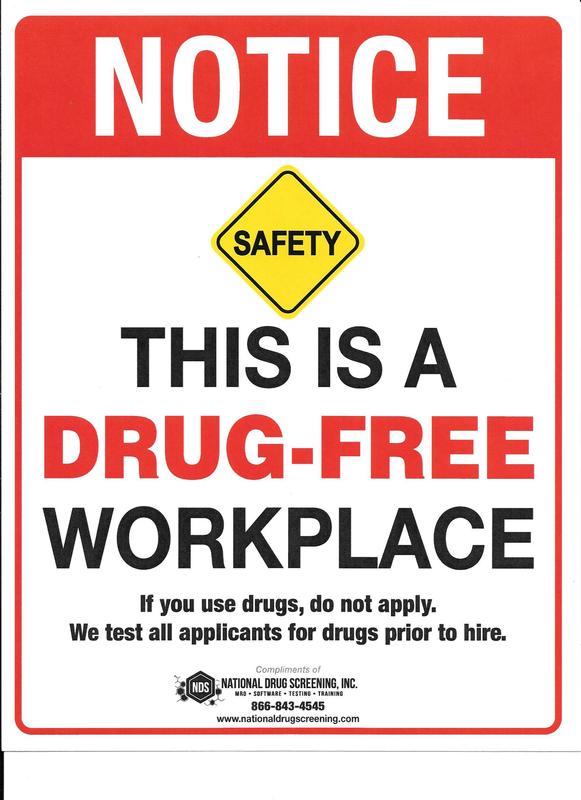National Drug Screening is committed to educating businesses and equipping them with tools to help them benefit from drug-free workplace programs. This article will share some big picture trends in drug free workplace and some best practices to help businesses maintain safe, healthy and drug-free workplaces.
A drug-free workplace is a comprehensive program for an employer to maintain safety and to take all steps possible to have drug free employees. The program has five components: written policy, employee education, supervisor training, employee assistance program and drug testing. Learn more about how to develop a drug testing policy.
Check out our free white paper on creating your Drug Screening Policy.
We happy to report that in recent years it’s become clear that more and more unions are taking a leadership role in the area of substance abuse prevention – supporting not only drug free workplace programs, but also drug testing. Why? Because unions have come to recognize that drug testing makes them safer, more marketable, and better able to compete for construction projects with non-union labor.
Many States have come a long way in promoting and becoming very active in developing drug-free workplace-related laws. Examples include:
- Workers compensation incentive laws that provide businesses with a discount if they implement prescribed elements of a drug-free workplace program;
- Drug-Free Workplace laws wherein if you do business with the state you have to ensure that your workplace is drug-free;
- State laws that specify limitations and procedures for how drug testing must be conducted; and
- Laws that offer certain protections for employers that conduct drug testing in certain ways.
- Laws granting unemployment denial when terminating for workplace misconduct specifically when testing positive for drugs or alcohol.
- Laws granting worker comp claim denial based on a positive test for drugs or alcohol following a workplace accident. This is commonly called the intoxication defense.
- Implementation of laws that make it criminal to sell substances for the purpose of adulterating specimens – cheating on drug tests.
Traditional 5 panel urine drug testing is not so traditional any longer. Many employers are utilizing expanded panel drug testing along with oral fluid or saliva drug testing and hair drug testing. Becoming a new norm is the 10 panel drug test with expanded opiates to include: Ten Panel with Expanded Opiates: Cocaine, Marijuana (THC, cannabinoids), Phencyclidine (PCP – angel dust), Amphetamines (including methamphetamines, also known as crystal meth), Opiates (including heroin, codeine, morphine, hydrocodone, hydromorphone, Oxycodone), Benzodiazepines (such as Xanax), Barbiturates, Methadone, Propoxyphene and Methaqualone (Quaaludes).
Paper is going away from drug testing with electronic scheduling of drug tests for both non-DOT and DOT drug testing programs. This will greatly improve the efficiency of the drug testing industry. eCCF is now a reality with electronic ordering and electronic processing.
Based on the success realized in the transportation industry (as measured by lower positive drug test rates); we are seeing many more industries implementing drug free workplace programs. Even in the construction industry we are seeing greater acceptance of drug-free workplace programs. And, rightfully so, as construction is an industry that is fraught with risk and a notoriously high prevalence of drug and alcohol use.
Let’s touch on some best practices foe successful drug free workplace programs. The first is to have a well thought-out drug-free workplace policy – one that clearly communicates what’s allowable, what’s not and how it’s going to be enforced.
A second important element is training and education – training for supervisors who are the first line of defense and responsible for enforcing the policy, and education for employees so that they recognize the signs of drug and alcohol misuse and are aware of what help may be available.
Number three is having support for your drug-free workplace policy at every level: from front-line workers to top level management.
And finally, there must be consistent and fair application of your drug-free workplace policy and program. Practices should be well thought out, fair and administered with consistency.
If you are looking for expert assistance in maintaining or implementing your drug free workplace program, now is the time to call Joe Reilly of National Drug Screening. Joe is a leading national expert on workplace drug testing and drug free workplace programs.







